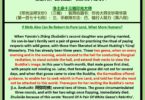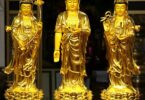Here is Sally’s testimony of what happened over five days. In between are my notes on the significance of the incidents. Sally (whose name has been changed for privacy) experienced the below while she was attending our July-August 2010 Pure Land class.
18 July 2010
Incidents: Received a call in the evening that grandfather is hospitalised, and has been having hallucinations since afternoon. He was unlike his normal self. He was bad-tempered and asked for many things. I give him a card with Amituofo’s (阿弥陀佛: Amitabha Buddha) picture, but he didn’t want it. He didn’t want to lie down but wanted to sit upright, while talking non-stop to my uncles and aunts despite panting heavily. I chanted Dizangjing (地藏经: Ksitigarbha Sutra) beside him. An aunt asked about it and I replied that it helps to clear negative karma. I didn’t tell her that it can help grandfather to pass away peacefully if his time is up. She assumed that he would recover. Upon seeing him, I whispered Amituofo’s name ten times into his ear, and repeated it before going home.
Notes: It is not uncommon for the dying who are not well spiritually trained to behave in a frustrated and confused manner, especially when they think or know that they are leaving. This is why they become irritable, while craving for various things, as their life is ending. Hallucinations are also common as the mind-state changes. However, not all visions are hallucinations as some are sights of beings unseen to us – also seen due to changes in mind-state. In the worst-case scenario, some of these beings might be ‘karmic creditors’ (怨亲宰主), who have ill intentions to mislead the dying to a lower realm of rebirth.
This is why it is important to practise chanting, the most simple of which is nianfo (念佛: mindfulness of Amituofo’s name) in the presence of the dying – to protect them from evil beings and to urge the dying to also practise nianfo sincerely (with right faith and aspiration) to protect himself and secure a safe rebirth in Pure Land. Chanting for another is also useful if the merits of doing so is shared accordingly. As the clear mindful hearing of the name of Amituofo is helpful for the creating strong impressions on the mind of the dying, while guiding the person to chant along, chanting audibly is very useful. This is called ‘help-chanting’ (助念).
19 July 2010
Incidents: Received a call at 5pm that grandfather was in a critical condition. All his friends and relatives rushed to see him for the last time. His behaviour was strange. His eyes opened very widely as he asked an aunt to turn on the lights. Perhaps, darkness was enveloping him. During these two days, I didn’t see him smile. I stood aside and kept reciting Amituofo silently. Again, I whispered Amituofo and the Three Refuges (三皈依) into his ear. I chanted Dizangjing at home and dedicated the merits to him too.
Notes: When one is dying, one’s physical sense faculties start to weaken and shut down, as the elements start to ‘dissolve’. The last remaining sense faculty working would be the mind, with which it is best to practise mindfulness of Amituofo. When the dying realise their time is really ending soon, it is natural for many to settle down in grim acceptance.
20 July 2010
Incidents: The doctor was very surprised that grandfather was still alive. In the afternoon, my husband went to offer a lamp to Dizang Pusa (Ksitigarbha Bodhisattva) at Poh Ern Shih for his benefit. I knew about this only later. When I visited him at 8pm, and sat beside him to chant Dizangjing, he was exceptionally happy and smiled at me. An aunt told me that since the afternoon, he had been very happy. Again, I whispered Amituofo into his ear. I placed the 大宝广愽楼阁善住秘密陀罗尼 (on a piece of paper with ‘the Esoteric Great, Precious and Extensive Pavilion Dharani for Good Abiding’) on his chest as I heard that it can help clear off negative karma.
Suddenly, when I was chanting sutra halfway, grandfather started saying ‘Ah Ah’ (阿阿). He looked very peaceful and was not suffering. I encouraged him by chanting a few times of Amituofo to him. He was smiling and went on to ‘Ah Mi’ (阿弥), as he struggled hard to move his mouth though he couldn’t really speak. I quickly got him the Amituofo card, which he grabbed and held on tightly. He kept saying ‘Ah Mi’ but couldn’t seem to pronounce the full name. I asked my husband to chant Amituofo beside him while I continued to recite the sutra.
I was very happy as he had rejected the same card earlier. What surprised me was that when my aunts saw that he was so happy, they stood beside me and chanted along. I took out another card with 西方三圣 (Three Saints of Western Paradise, the central of whom is Amituofo) and grandfather took it in his hand too. Everyone was encouraging him to let go of whatever he had on his mind to relax. Only then did I know they joined me in the chanting as grandfather had told them earlier in the afternoon that he would be leaving at 12.30 am – which I only knew about later. An uncle rushed in to see him, upset that his father was leaving soon. But when he saw how peaceful he was, he was relieved. I chanted until 12.00 am as my husband had to work the next day. Before we left, grandfather opened his eyes and looked at us. He was smiling and seemed a bit teary.
Notes: It is possible that the connection to the Bodhisattva on the behalf of the dying helps to uplift his mind with his blessings. Ksitigarbha Bodhisattva also vowed to guide beings to Amituofo’s Pure Land. The above mantra helps to guide those who touch it to be free from fear, pain and disturbances from evil spirits… However, the dying should still practise mindfulness of Amituofo for rebirth in Pure Land, which is already the simplest practice possible. The difficulty to chant properly when ill and weak is a reminder that it is important to practise mindfulness of Amituofo well in everyday life to prepare for our final practice. However, even if it is too difficult to chant aloud, one can chant silently in the mind too. The acceptance of the card means there is taking of refuge in Amituofo, even if not formally in a ceremony, even if due to some desperation. For fruitful mindfulness of Amituofo, the mind has to let go of attachment and aversion to all things and settle only on the name of Amituofo.
21 July 2010
Incidents: An aunt told me that at 12.30 am yesterday, she and my mother saw lots of smoke rising from grandfather’s face. They had touched his body and called to him then, which probably made him reluctant to leave. My sister informed me that grandfather gave another departure timing – ‘5.30’. We didn’t know whether if he meant ‘am’ or ‘pm’. When an uncle told grandfather he was leaving yesterday, grandfather told him to take his time, and shouted ‘5.30’. On that evening, I felt some goosebumps.
At that time, I didn’t believe that grandfather could go to Pure Land as he wasn’t Buddhist, never chanted Amituofo, and never visited a Buddhist temple. Moreover, he used to rear and sell pigs in his younger days. However, one of my Buddhist friends assured me that if grandfather could tell the timing of departure, he could had seen Amituofo. She encouraged me to chant Amituofo on behalf of grandfather even if I felt weak. I also asked my friend ‘What’s the use of learning Buddhism when young?’, and she replied, ‘So that you are able to help others.’ I had wanted to stay in hospital till 5.30 am to chant for grandfather but my aunt and Mum asked me to go home, saying they will do the chanting.
Notes: The smoke seen rising could be part of his energy dissipating from the body. We should avoid touching the body of the dying and that of the newly deceased (for at least eight hours), as this can be very painful due to the magnification of sensitivity when the mind frees itself of the body, or if it still resides in it. Touching the body or asking the dying not to leave can also disrupt a smooth departure. It is possible for one who has not practised the Buddhist teachings properly most of the time when well and alive to be born in Pure Land – provided that one nurtures the right faith, aspiration and practice in time, which also helps to dilute the effects of negative karma. Even if the dying did not personally practise much nianfo at first, it is possible for him to experience the blessings from Amituofo or even see him if someone dedicated practises help-chanting for him, which invokes his arrival. These experiences can then increase faith in the dying, which leads to the rise of the aspiration to follow Amituofo, and the practice of proper nianfo to do so.
One of the classic auspicious signs that one has taken birth in Pure Land is when one is able to announce the time of departure, and leaves on time (预知时至), as it is impossible for the timing to be known accurately unless the enlightened being one was mindful of (Amituofo) tells one so and comes on time to receive the dying. Delays in departure are usually due to some remaining attachment to the life one leaves behind, or some lack of aspiration to go to Pure Land. Also, the fact that the dying is able to announce the time shows that the person already has no significant attachment (贪) to life or aversion (嗔) to death, which reflects a mind-state that is at peace and relatively clear of delusion (痴) in the moment. This state of mind is possible due to the self-power of the dying who practises nianfo sufficiently, which connects to the other-power of Amituofo, whose blessings uplift the mind of the one mindful of him. If the dying’s announcement of the departure time is grossly inaccurate, the person must surely by deluded, with much remaining attachment to life and aversion to death.
22 July 2010
Incidents: Grandfather passed away peacefully at 5.39 am, which is very close to the timing of 5.30 am. I can’t tell if grandfather was reborn in Pure Land for absolute certainty, but it is likely that he did. Some think he visited home on the seventh night, but it isn’t certain. During the cremation, my aunts lost control and cried very loudly. I had shared with them that it is alright for grandfather to go to Pure Land first, but they didn’t seem to believe in it, while they kept asking grandfather to go home with them after the cremation. From this incident, I learnt that is very important to take control of our own lives, and to cherish life and the people we love. Amituofo.
Notes: It is not advisable for the survivors of the deceased to be negatively emotional, and to make irrational pleas where the consciousness of the deceased might be present as this can disturb the peace of mind of the deceased greatly and cause confusion. If one is uncertain if someone has been reborn in Pure Land, or at least taken a general good rebirth, one can still practise nianfo to share merits with the deceased, and hope the deceased, if still around, can do the same. Even if the deceased has been reborn in a lower realm, one can still practise nianfo to share merits to facilitate the lessening of suffering there, and the hastening of a better rebirth from there. However, for one’s rebirth in Pure Land to be possible, one should still practise nianfo personally. Amituofo






Very nice story! Thank you very much for the kind & prompt sharing & contribution!